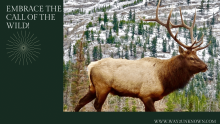Call of the wild

The idiom “call of the wild” refers to a strong, innate, or primal urge that draws someone to nature, the wilderness, or a more untamed and free way of life. It often symbolizes the longing for adventure, freedom, and a connection to the natural world. This phrase is commonly used to describe a deep yearning or desire to escape the constraints of modern life and return to a more primitive, wild existence. It suggests a pull towards the unknown, the unexplored, and the untamed aspects of the world.
The origin of this idiom can be traced back to Jack London’s novel “The Call of the Wild,” where the protagonist, a domesticated dog named Buck, feels the primal call of his ancestors and the wild environment, leading him to embrace his true nature and instincts in the wilderness. People may feel the call of the wild when they seek adventure, solitude, or a break from the hustle and bustle of city life. It represents a yearning for simplicity, authenticity, and a deeper connection to the natural world.